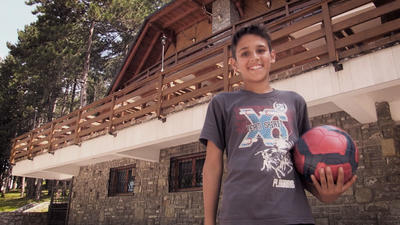Aurelie Ponthieu, Humanitarian Advisor on Displacement, Médecins Sans Frontières/Doctors Without Borders (MSF)
Today, the United Nations General Assembly will bring together Member States for the first-ever Summit on Refugees and Migrants.
While an already released draft declaration enshrining the outcomes promises a more coordinated, more humane, more responsive approach to people on the move, the declaration’s lofty aims are contradicted by the actual practices of many of the States who will participate in New York but enact the polar opposite.
Instead of respecting the rights of individuals and upholding pre-existing obligations, far too many governments are adopting ever more restrictive and damaging approaches that seem designed to further harm already vulnerable men, women, and children and to keep them as far from sight as possible.
MSF teams see the destructive consequences of this on a daily basis, as we deliver emergency medical care in many of the countries people are fleeing, along the routes they travel, and in countries in which they seek refuge.
75,000 Syrians trapped on 'the berm'
Take the stretch of wasteland along the Jordan-Syria border known as 'the berm', where some 75,000 Syrians – four out of five of them women and children – languish in inhumane conditions just a few kilometres removed from a war zone.
MSF mobile teams that had been caring for people on the berm in the weeks before the border closed in June treated more than 200 malnourished children and 500 pregnant women, including those with high risk pregnancies needing close management.
These people are unable to cross a closed border, unable to return home because of the catastrophic war in their country and unable at present to access basic services to help them survive. So what will become of them following the UN Summit on Refugee and Migrants? How will they fit into this new blueprint?
Violence in the Americas
Elsewhere, our teams see refugees and migrants denied any form of safe passage, moving across perilous routes and sometimes dying in the process. In the Americas for example, an estimated 300,000 people from El Salvador, Honduras, and Guatemala head north every year to escape poverty, rapacious criminal gangs, and violence as fierce as any war zone.
They hope to gain asylum in Mexico or move onwards to the US but Mexico, with American backing, grants legal protection to less than one percent of these people, sending most of them back to danger in their home countries instead.
MSF teams in Mexico report that 68 percent of patients have been assaulted while in transit. One third of the women had been sexually abused. Will ratifying states address this situation?
Globally, many people on the move suffer violence—in many cases, coming atop the violence that caused them to flee home in the first place.
European refugee crisis
Since launching search and rescue operations in the Mediterranean Sea, where more than 3,200 people have died in 2016 alone, MSF teams have pulled more than 35,000 people – and increasing numbers of unaccompanied minors – from the sea.
MSF medical teams on board rescue boats continue to treat and bear witness to the consequences of physical and psychological violence inflicted on those travelling through Libya.
Patients describe brutal encounters with smugglers, border guards, and other predators. They have been detained, beaten with rifles, whipped with hoses, robbed, held for ransom, or sexually assaulted. We estimate nine out of ten of those we have rescued have endured some form of violence.
Refugees and migrants also face violence on other European borders, on the Serbian border with Hungary, for instance, where one in three of our patients report being assaulted, often by state authorities. Will UN leaders provide these people with better and safer alternatives? Or will they continue erecting new walls and ever crueler forms of deterrence?
Cynical EU-Turkey deal
Six months on from the cynical EU-Turkey deal, all signs indicate that deterrence will continue to be the focus of most states as they attempt to manage the global displacement crisis.
Signed by all 28 European Union Member States in order to block asylum seekers from European shores, the deal is hailed as a success despite the fact that nearly 60,000 men, women and children, most of whom are fleeing wars in Syria, Iraq and Afghanistan, are stuck in Greece, on prison islands that they cannot leave or in isolated and under resourced camps in the mainland.
Faced with uncertain futures, arbitrary detention and inadequate conditions the physical and mental health of many is deteriorating as the days go slowly by.
In May, citing the EU-Turkey deal, Kenya announced the upcoming closure of the world’s largest refugee camp, Dadaab, in north western Kenya where 350,000 Somalis driven from conflict, draught and privation have been living in a limbo for years, even decades.
A household survey conducted by MSF in August 2016 indicated that despite the dreary living conditions, most people would strongly prefer to remain in Dadaab rather than return to Somalia. While keeping hundreds of thousands of refugees in limbo in Dadaab entirely dependent on aid is hardly a solution, forcing them back to Somalia is both inhumane and against the principle of non refoulement.
Will the UN Summit accept that their only alternatives are to live in an inadequate camp or to be sent back to an active conflict zone? Or make concrete change?
Empty promises
These are far from the only examples we could cite and just some of the questions we ask of the world leaders attending the summit.
Given this tumultuous state of affairs in which human life and dignity is fast trampled underfoot, we should be encouraged by the language emerging from the UN Summit.
But unless numerous governments plan to radically alter their response and policies on refugees and migrants, this UN gathering will yield little more than feel-good rhetoric and empty promises.
It will ensure only the continued suffering of millions.





